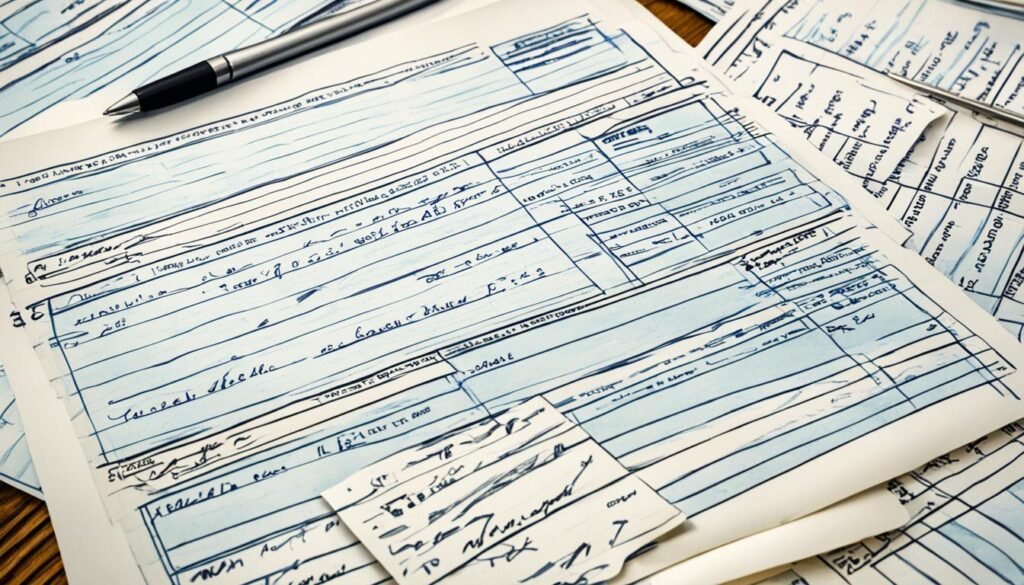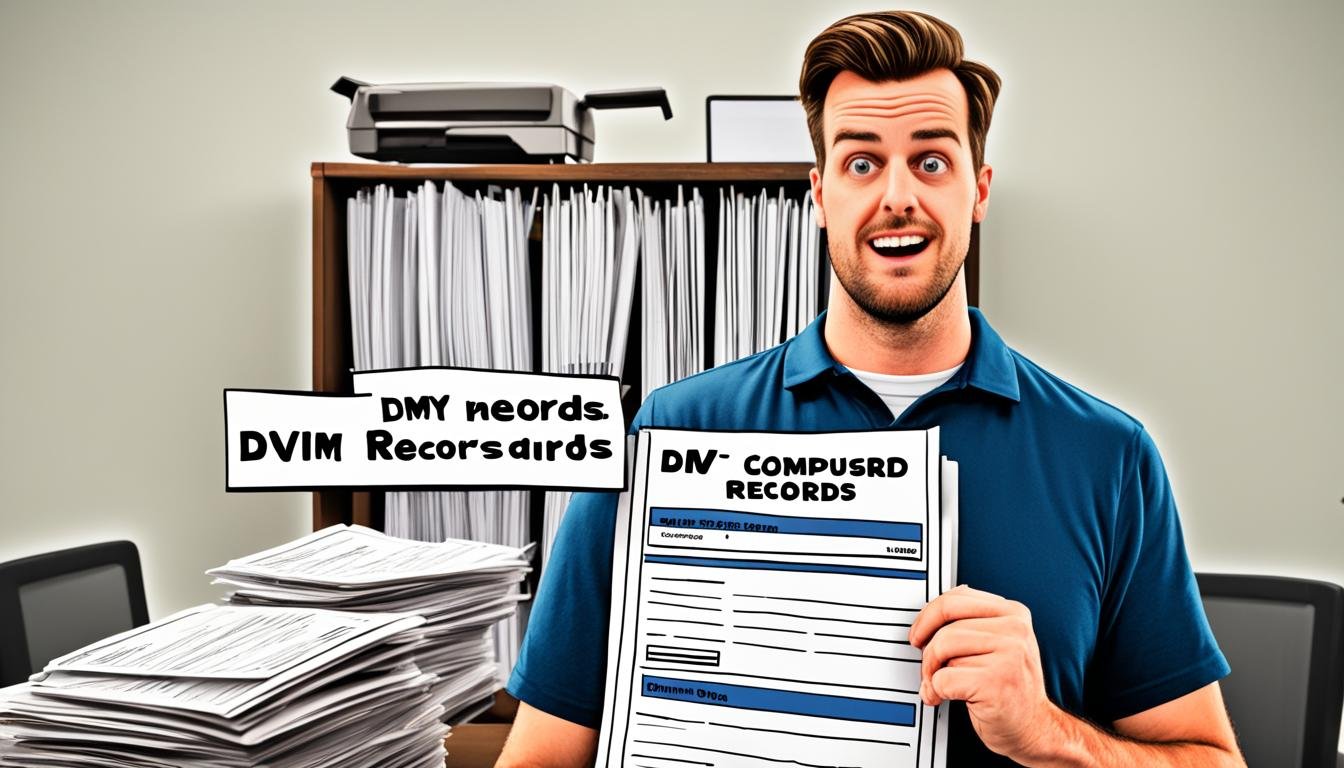Ever think about replacing a lost mobile home title when you can’t find the data plate or VIN? It’s a real challenge for mobile home owners. If you’re missing your title and can’t provide a data plate or VIN, selling or refinancing gets really tough.
Here’s an example: some folks buy their mobile home and lot, but they never get the title they need. This gets even harder with older models, like a 1973 mobile home, that might not have a visible VIN. Plus, if there are no information plates, it’s even trickier. To make matters worse, some places might not have any records at all1. But, don’t worry. There are ways to deal with this challenge and get that mobile home title replaced.
Key Takeaways
- Lost titles without data plates or VINs pose significant challenges for mobile home owners.
- Older models like a 1973 mobile home may lack visible VINs but have alternative locations to check1.
- The absence of proper documentation can stymie efforts to sell or refinance the mobile home1.
- Investigating previous building permits or county records might provide essential data.
- The IBTS offers services to help verify missing HUD tags and data plates2.
Understanding the Importance of the Mobile Home Title
A mobile home title is more than just proof of ownership. It is essential for many legal deals, like buying or selling your home. Losing this title could lead to big legal issues. So, it’s important to know why it’s so crucial. Let’s take a closer look at the reasons behind its importance and what happens if you lose it.
Why Mobile Home Titles Matter
A mobile home title shows you legally own the home. It includes important info like the home’s serial number and when it was made. This information is also on the data plates, used for working on your home. For example, without these data plates, fixing your home could be harder and less safe3. So, the title is key for keeping your home up to code and safe.
Legal Ramifications of a Lost Title
If you lose your home’s title, it’s a big deal legally. Selling or moving the home becomes as hard as selling a car without its title4. You also can’t easily mortgage it or get loans without a title. This can cause financial trouble. Plus, not having a title can mean you face problems with old debts or family members who claim part ownership4. The title is also key for tax reasons and state processes that might affect the home’s ownership status4. Knowing this helps you understand how vital your mobile home’s title is.
In sum, a mobile home title is extremely important. It affects how you can use your home, your money dealings, and its legal status. Protecting and taking care of it is crucial to avoid major issues.
Initial Steps: Confirm Ownership and Gather Information
To start, make sure you own the mobile home and get all the needed documents. This step is key for an easy replacement process. By checking ownership and gathering paperwork well, you make things go smoothly.
Verifying Ownership of the Mobile Home
It is crucial to confirm you own the mobile home if you lose the title. Begin by looking at past sales or payment documents. These papers can show you really own the home. Also, for mobile houses made before 1976, the serial number might be on the I-beam under the home near the hitch end1. If the home is now part of real estate, its title could be retired with a deed taking its place. So, you should check if there’s a deed instead of a title5.
Collecting Relevant Information from Previous Owners
Speaking to previous owners can really help with getting the necessary records. Looking through old insurance or buying papers can give clues. Homes made before 1976 have shorter serial numbers, usually 4 to 6 digits1. For newer homes, you might find the VIN in different places, like the front part behind the skirting. Or it might be on a metal crossmember upfront5. If you can’t find the paperwork, states have ways to help you get a VIN and title. This can involve sending notices to last owners or selling the home at auction5.
Taking these first steps is important. It makes replacing the title easier and ensures you have all required documents. This way, your claim to the home is well-supported.
Locating the VIN on Older Mobile Homes
It’s important to find the VIN on older mobile homes for many reasons. These include taking care of legal issues and knowing who owns or lived in the home before you did.
Common Locations of VIN on Mobile Homes
The VIN is often found on the front bumper or the main I-beam near the hitch. Sometimes, the VIN is hard to see because of paint or rust. To read the VIN on an old mobile home, you might need to clean or sand the area. An example is a 1973 mobile home from Illinois, where finding the VIN took extra work1. Make sure to look very carefully to get the VIN right.
Searching for VIN on Frames and I-beams
Searching the frame and I-beam might also reveal the VIN. But, it may not always be there. People have found the VIN in closets or on wall panels in some cases. Take the 1978 Bendix mobile home, where its data plate wasn’t in the usual spots, so a detailed house search was needed1. A VIN is made up of numbers for the home’s identity, factory codes, and state codes6.
If the VIN is not stamped, keep looking in unusual places. The VIN might tell you if the home has more than one part with letters like A or B. This is common with double-wide or triple-wide homes. Knowing this makes finding the VIN easier6.
Figuring out where the chassis number is in a mobile home is crucial. It keeps you on the right side of the law and makes sure the home’s history is clear. Finding the VIN early can prevent difficult legal or ownership issues later.
Lost Mobile Home Titles No Data Plate No VIN No HUD label
Trying to find missing documents for a mobile home can be tough, especially without a VIN, a data plate, or a HUD label. To solve this challenge, it’s important to try other ways to get the info needed. For example, checking the frame of the home could reveal a VIN number, which is usually welded on5. You can also search behind the water heater or inside kitchen cabinets for helpful details7.
Getting a title without a VIN involves certain steps. You must send notices to the last owner, advertise a public sale, and check that the VIN isn’t there in person. This whole process usually takes around three months5. It’s also smart to look into old building permits. The local building department might have notes with the home’s make and serial numbers7.
Local county offices or the Institute for Building Technology and Safety (IBTS) could also be helpful. In some places, like West Virginia and Oklahoma, mobile homes are seen as real estate if they’re on a firm foundation. Then, the title becomes a deed under the owner’s name5. Checking these sources might give you the key info to get new titles or VINs, fixing your lost document problem.
Utilizing Insurance Documents for VIN Information
Finding mobile home insurance records is key to discovering a home’s VIN. Insurers keep detailed information on covered homes. Yet, for homes made before 1976, finding the VIN can be hard. Such houses might not have a VIN or HUD label at all1.
To show your home’s identity and who owns it, mobile home policy information is very useful. These documents tell everything about the insured home. You can find details like who made it, where it was made, its serial number, and section code6.
Old insurance papers can also clue you in on data plates and zone rules from about 1978 when they started making these standard. For homes with several parts, the policy might show different VINs for each part. This really helps to correctly identify all parts6. Always try to get all the info you can from these records. This helps prove you own the home and makes it easier to get the title back.
Contacting the Previous Owner or Dealer for Information
Getting the original bill of sale or title is key in tracing a mobile home’s past. Often, past owners have this important paperwork. It can help a lot when trying to solve issues with the home’s history. Especially since some homes don’t have their VIN clearly marked1.
Importance of Previous Owner Documentation
Lost titles and missing VINs? Previous owner documents are often a big help. You should look for old insurance, receipts, and purchase records. Many owners struggle to find VIN numbers, making these documents even more important. This info is crucial when the VIN is hard to spot1.
Role of Dealers in Retrieving Information
Dealerships keep good records of sold homes. For homes made after June 15, 1976, there’s detailed information on HUD Labels. When a dealer is gone, these records might still be reachable. It’s important to ask around. You might find the info you need8.

Searching for Data Plate and HUD Labels
Finding the data plate and HUD labels in your mobile home is crucial. It’s important for legal and insurance reasons. Without these documents, confirming your home’s details is hard.
Common Locations of Data Plates
Data plates are often in utility places, cabinets, or closets in the mobile home. Sometimes, a home might not have a HUD tag or data plate. This is not common. In such cases, checking the outside of the home or looking in local records is necessary to find these details7.
Contacting the Institute for Building Technology and Safety (IBTS)
If you can’t find the data plate or HUD labels, reach out to the Institute for Building Technology and Safety (IBTS). They keep thorough records. They can help you look up the necessary data. For example, the HUD might not be able to check a partial serial number. This means that particular number has no relevant manufacturer. It’s a special case. This shows how important it is to use the IBTS’s records to verify information7.
Some say you can try removing foundation blocks or looking in the electric panel or cabinets. These efforts may help find the serial number7. They are important in finding the data plate and HUD label, indicating a need for careful searches and trustworthy sources like the IBTS.
provides tips from other mobile home owners. It suggests more places to look for the data plate and serial number. This highlights the need for persistence and expert advice to solve document problems.
Using Tax and County Records to Find Information
Looking for a lost mobile home title? Turn to mobile home tax records and county searches. They share key information like serial numbers and who owned it before. This info is crucial for getting a new title. For example, tax records show us the previous owner’s name. This makes a search in county records for more details much easier.

Older mobile homes, especially those made before 1976, can be tricky. They may not have typical VINs or their serial numbers might not look like today’s VINs1. This is where public records shine. They let us piece together the home’s past, even when official labels are missing.
Let’s take Oklahoma, for instance. There, assessors can help with getting a new VIN and title for mobile homes without VINS, making the process smoother5. In Indiana, there’s a process for dealing with abandoned mobile homes. It involves things like public auctions and checks for VINs during inspections5. All these steps add to the info we gather from county records.
Using county and tax records is very helpful. This is especially true when the home model or year makes finding a VIN tough1. For example, 1978 Bendix mobile homes and 1971 VINs are often hard to track down. Still, knowing where to look and what to look for can really help in these searches2.
Engaging the DMV for Assistance
The DMV is a key ally when you’re missing a title for your mobile home. They use your address history and may do checks at your home. This helps find serial numbers and check ownership, making the process effective.
How the DMV Can Help
The DMV offers lots of services to help you get your mobile home title back. They guide you on transfering titles, removing liens, or changing your name. For this help, you might have to pay small fees, like $23 for changing a title and $8 for lien removal9. If you’re using your mobile home as part of your land, you might not need a title in some cases9. The DMV makes sure the titles they give meet all rules and laws.
Required Documentation for DMV Assistance
When asking the DMV for help, you need certain papers. You should show you owned the mobile home, like old sales receipts or loan papers, plus some ID. If there has been a name change or the owner passed away, you’d need extra steps and fees depending on the estate’s worth9. Having everything you need ready makes the process easier.
If titles have mistakes or your name has changed, the DMV can tell you how to fix these issues. Some fixes might need a power of attorney9. The DMV’s detailed help covers all parts of getting a new title, making it a go-to for mobile home owners who’ve lost their title.
Thank you for reading! Stay updated with the latest insights from Junk Home Buyer.
Source Links
- https://forum.mobilehome.com/viewtopic.php?t=84167
- https://www.kin.com/blog/mobile-home-vin/
- https://cashnowformyhome.com/data-plate-for-a-mobile-home/
- https://forum.mobilehome.com/viewtopic.php?t=92397
- https://forum.mobilehomeuniversity.com/t/lost-title-and-no-vin/25942
- https://www.jergermga.com/manufactured-homes-vin-numbers-and-data-plates/
- https://forum.mobilehome.com/viewtopic.php?t=19010
- https://samco-amc.com/blog/manufactured-home-missing-hud-plate
- https://dsps.wi.gov/Pages/Programs/MH/Default.aspx


